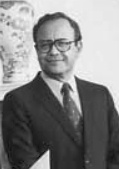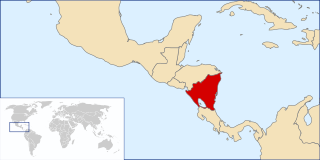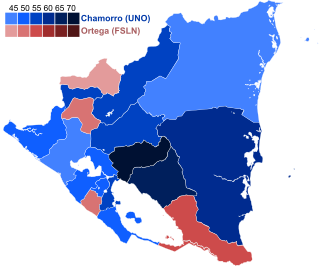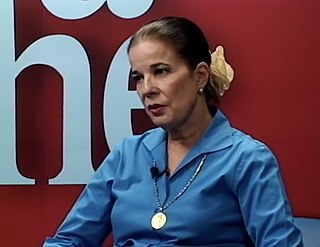
The Sandinista National Liberation Front is a socialist political party in Nicaragua. Its members are called Sandinistas in both English and Spanish. The party is named after Augusto César Sandino, who led the Nicaraguan resistance against the United States occupation of Nicaragua in the 1930s.

Violeta Barrios Torres de Chamorro is a Nicaraguan former politician who served as the 55th President of Nicaragua from 1990 to 1997. She was the first and, to date, only woman to hold the position of president of Nicaragua. Previously, she was a member of the Junta of National Reconstruction from 1979 to 1980.
Edén Atanacio Pastora Gómez was a Nicaraguan politician and guerrilla who ran for president as the candidate of the Alternative for Change (AC) party in the 2006 general elections. In the years prior to the fall of the Somoza regime, Pastora was the leader of the Southern Front, the largest militia in southern Nicaragua, second only to the FSLN in the north. Pastora was nicknamed Comandante Cero.
Pedro Joaquín Chamorro Cardenal was a Nicaraguan journalist and publisher. He was the editor of La Prensa, the only significant opposition newspaper to the long rule of the Somoza family. He is a 1977 laureate of the Maria Moors Cabot Prize of Columbia University in New York. He married Violeta Barrios de Chamorro, who later went on to become President of Nicaragua (1990–1997). In 1978, he was shot to death, one of the precipitating events of the overthrow of the Somoza regime the following year.

The Junta of National Reconstruction was the provisional government of Nicaragua from the fall of the Somoza dictatorship in July 1979 until January 1985, with the election of Sandinista National Liberation Front’s Daniel Ortega as president.
La Prensa is a Nicaraguan newspaper, with offices in the capital Managua. Its current daily circulation is placed at 42,000. Founded in 1926, in 1932 it was bought by Pedro Joaquín Chamorro Zelaya, who had become editor-in-chief. He promoted the Conservative Party of Nicaragua and became a voice of opposition to Juan Bautista Sacasa, for which the paper was censored. He continued to be critical of dictator Anastasio Somoza García, who came to power in a coup d'état.
The Democratic Revolutionary Alliance were the Southern Front guerrillas in Nicaragua that fought against the Marxist–Leninist elements of the original Sandinista that took part in the Nicaraguan Revolution of 1979. Despite being one of the Contra forces, they maintained an ideological distance from the U.S.-backed Nicaraguan Democratic Force (Contras).

Arturo José Cruz Porras, sometimes called Arturo Cruz Sr. to distinguish him from his son, was a Nicaraguan banker and technocrat. He became prominent in politics during the Sandinista (FSLN) era. After repeatedly resigning from positions in protest, opinion divided between those who lauded him as a statesman and man of principle, and those who derided him as an ineffectual hand-wringer.
El Grupo de los Doce, or Group of Twelve, were a dozen members of the Nicaraguan establishment whose support for the Sandinista National Liberation Front (FSLN) against President Anastasio Somoza Debayle played a pivotal role in the acceptance of the Sandinistas by foreign and domestic opinion.
Fernando Chamorro Rappaccioli, known as "El Negro" ("Blackie") for his dark complexion, was a longtime Nicaraguan rebel fighting both the Somoza and Sandinista regimes. Efforts to build a Contra Southern Front around him played a part in the Iran-Contra Affair.
Jorge Salazar Argüello, a Nicaraguan coffee grower and popular leader of UPANIC, seemed poised to become the leader of the opposition to the Sandinista government, until his death at the hands of State Security forces.
The Nicaraguan Democratic Union was founded in late 1980 by José Francisco Cardenal, an early leader of the anti-Sandinista rebel movement that became known as the Nicaraguan Contras. The UDN was based in Miami, Florida, among its growing community of exiles from Nicaragua's middle class. It established an armed wing, the Nicaraguan Revolutionary Armed Forces.

The following is an alphabetical list of topics related to Nicaragua.

General elections were held in Nicaragua on 25 February 1990 to elect the President and the members of the National Assembly. The result was a victory for the National Opposition Union (UNO), whose presidential candidate Violeta Chamorro surprisingly defeated incumbent president Daniel Ortega of the Sandinista National Liberation Front (FSLN). This led to a historic peaceful and democratic transfer of power in Nicaragua.
In 1979, the Sandinista National Liberation Front (FSLN) overthrew Anastasio Somoza Debayle, ending the Somoza dynasty, and established a revolutionary government in Nicaragua. Following their seizure of power, the Sandinistas ruled the country first as part of a Junta of National Reconstruction. Following the resignation of centrist members from this Junta, the FSLN took exclusive power in March 1981.

Claudia Lucía Chamorro Barrios is a Nicaraguan writer, public health official, and former ambassador of Nicaragua to Cuba and Costa Rica. She served as a diplomat on behalf of the Sandinista government in the 1980s. She later became a critic of the FSLN. She is the author of a memoir, Tiempo de Vivir.

Moisés Hassan Morales is a Nicaraguan politician. He was one of five members of the Junta of National Reconstruction that ruled the country from 1979 to 1984, following the fall of the Somozas regime.
Pedro Joaquín Chamorro Barrios is a Nicaraguan journalist and politician. He began his career in journalism working at La Prensa, following the 1978 assassination of its editor, his father, Pedro Joaquín Chamorro Cardenal. Working on the side of the Contras in exile in the 1980s, he returned to the country in 1989 when his mother Violeta Barrios de Chamorro ran for president, and following her election, served as a Nicaraguan ambassador. He later became defense minister. In the 21st century, Chamorro has been a city councilor for Managua and deputy in the National Assembly, also for Managua. On 25 June 2021, he became part of a wave of arrests of opposition and civic figures in Nicaragua.

Jaime Chamorro Cardenal was a Nicaraguan newspaper editor and publisher. A civil engineer by training, journalism was the family business, as his father owned the newspaper La Prensa. Chamorro joined La Prensa in 1974, where he worked for 47 years and served as publisher for 28, from 1993 until his death in 2021.









